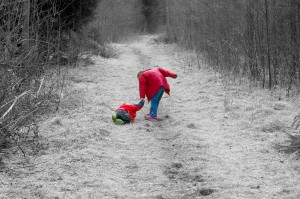On Drooping and Tottering
 Just a short reflection from one of those mornings when God seems distant and despondency seems close. I have learned over the years that such moments are cues to run towards Jesus, no matter how much you don’t feel like doing that. And so I turned to where I’m up to in my readings, which happened to be Hebrews 12.
Just a short reflection from one of those mornings when God seems distant and despondency seems close. I have learned over the years that such moments are cues to run towards Jesus, no matter how much you don’t feel like doing that. And so I turned to where I’m up to in my readings, which happened to be Hebrews 12.
Hebrews 12 is all about how God in his love disciplines his people. It applies to times of trial, adversity, difficulty, despondency. “Endure trials for the sake of discipline,” it says, “God is treating you as children; for what child is there whom a parent does not discipline?” (Heb 12:7 NIV) Which, in and of itself, can feel of no great immediate encouragement. Although I have come to know over the years that it is true, that “discipline always seems painful rather than pleasant at the time, but later it yields the peaceful fruit of righteousness to those who have been trained by it” (Heb 12:11 NIV), what does that mean for the immediate moment? That I should just wallow until it’s over?
But Hebrews 12 does have an imperative in it, a true exhortation that hadn’t really seized me before. It’s in verses 12 and 13. Let me quote it using the Complete Jewish Bible (CJB) version, because it makes it very clear:
So, strengthen your drooping arms, and steady your tottering knees; and make a level path for your feet; so that what has been injured will not get wrenched out of joint but rather will be healed. (Heb 12:12-13 CJB)
This is an exhortation that looks towards the fruits of the discipline: Strengthen yourself, steady yourself, level off your path. These are both self-caring exhortations and looking-ahead and keep-moving exhortations. They are exhortations that recognise that the hurt and the injury of the season is real. Something has been injured (the NIV talks about that which has become lame) and now the task is to move forward in a way that will allow it to heal and not be wrenched out of joint and possibly permanently damaged.
The chapter then goes on to talk about avoiding bitterness and living in peace with one another: the exact sort of thing that would cause an injury to fester.
Today this is encouragement. Despondency can be real. But by God’s grace it is not devoid of purpose. And there is a constructive task which is both valid and graspable: to steady myself, move forward and so embrace healing. God is good.
Photo credit: http://www.freeimages.com/photo/695214
![]() On Drooping and Tottering by Will Briggs is licensed under a Creative Commons Attribution-NonCommercial-ShareAlike 4.0 International License.
On Drooping and Tottering by Will Briggs is licensed under a Creative Commons Attribution-NonCommercial-ShareAlike 4.0 International License.


